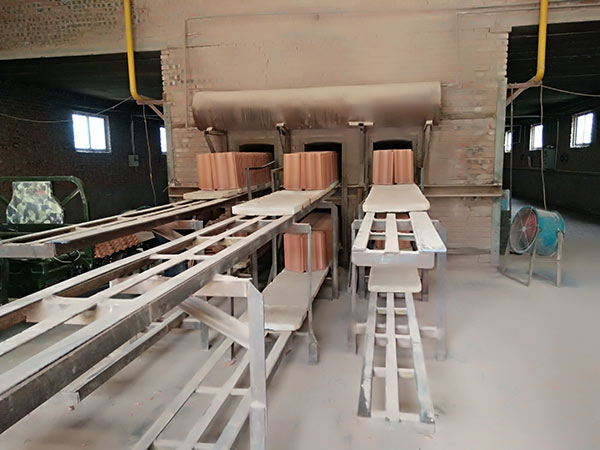1700℃ push plate kiln is a continuous heating and sintering equipment that has been improved several times on the original porous kiln. Ngayon, PER Resistant Materials introduces corundum mullite brick for 1700℃ push plate kiln to those who are interested in corundum mullite bricks or push plate kilns.


What Is a Pusher Kiln? Why Choose Corundum Mullite Bricks?
Push-slab kiln is a tunnel kiln, and the refractory material used for the lining is selected according to the products produced and the temperature and heat source inside the kiln.
The kiln lining of the 1700℃ pusher kiln needs refractory bricks with good thermal shock resistance according to the characteristics of the kiln, and corundum mullite bricks are recommended, which have good thermal shock resistance.
The design of the combustion chamber on both sides of the pusher kiln using coal heating and combustion is called a coal-fired pusher kiln.
With the increasing awareness of environmental protection, the use of coal-fired pusher kilns is more often changed to gas furnaces, using natural gas or gas for combustion heating.
Commonly Used Refractory Materials For Pusher Kilns
The heat loss of a pusher kiln is mainly concentrated in the heat dissipation of the kiln body. Flue gas takes away sensible heat and incomplete combustion.
The four aspects of heat loss are heat dissipation from the kiln body, incomplete combustion, and the removal of sensible heat by the flue gas of the pusher bricks and kiln furniture. Kaya nga, taking corresponding measures for these aspects is the key to energy saving and consumption reduction.
Nowadays, most manufacturers use refractory bricks for kiln walls to reduce one-time investment. According to the kiln temperature, mataas na alumina brick, mga brick ng luwad, corundum mullite brick, atbp., the middle and the top of the kiln are insulated with light insulation bricks or insulation materials.


Advantages Of Corundum Mullite Bricks For Push-Slab Kiln
Corundum mullite bricks for push plate kiln at 1700℃ are made of corundum and mullite as the main raw materials, which are fired at high temperature under oxidizing atmosphere by adding the appropriate amount of alumina, silicon oxide superfine powder, and additives.
Corundum mullite products billet is formed by a 300t friction press, and the density of the billet is 2.7g/cm3. The billet is dried in a tunnel dryer. The inlet temperature is 40~50℃, the drying temperature is 130℃, the drying time is 48 mga oras, and the moisture of the billet is not more than 1.5%. The products are fired in the tunnel kiln with a firing temperature of 1550℃ and a holding time of 10 mga oras.
The physical and chemical properties of corundum mullite brick are: Al2O3 is greater than 85%, Fe2O3 0.45%, apparent porosity 19%, room temperature compressive strength greater than 55MPa load softening temperature greater than 1700℃, heating line change (1600°C, 3h) -0.1%, thermal shock resistance (1100℃ water cooling) greater than 30 times.
This product can be directly contacted with flame, anti-flaking, high-temperature resistance, can be used as heat insulation lining of high-temperature industrial furnaces, but also as the working layer of other industrial high-temperature kilns.
It is mainly used in the petrochemical industry, large and medium-sized ammonia gasification furnaces and magnetic material gas furnace materials, high-temperature industrial kiln supporting facilities materials, atbp.
The corundum mullite brick for the 1700℃ push plate kiln is introduced here, hope it will be helpful to you. PER refractory company as a professional refractory manufacturer can produce more than forty different types of refractory insulation products. Product types are distinguished from the type and formula ratio, a wide range of products, and cheap. Basically can meet the current stage of a variety of large boilers, industrial furnaces, and other thermal equipment needed for high-temperature requirements, product quality is worth your trust.
